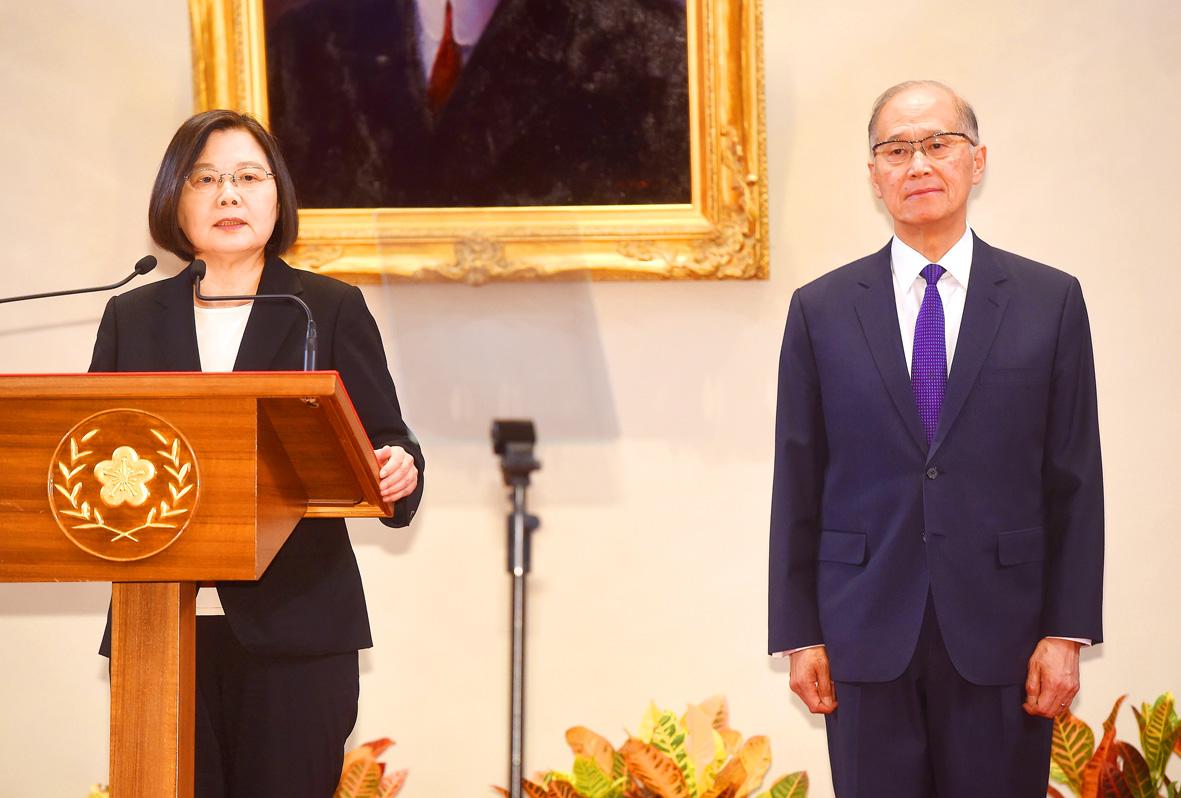President Tsai Ing-wen (蔡英文) yesterday appointed Straits Exchange Foundation (SEF) Chairman David Lee (李大維) as the new Presidential Office secretary-general, as she warned the Cabinet against damaging the public’s trust in the government.
Lee replaces Su Jia-chyuan (蘇嘉全), who resigned on Sunday, after his nephew, Democratic Progressive Party (DPP) Legislator Su Chen-ching (蘇震清), was implicated in a bribery case.
Su Jia-chyuan said that he was worried it could negatively affect Tsai’s presidency.

Photo: Chien Jung-fong, Taipei Times
Su Chen-ching is accused of taking bribes from businessman Lee Heng-lung (李恆隆) to lobby for a legal amendment.
Lee Heng-lung has been engaged in a legal fight with Far Eastern Group (遠東集團) chairman Douglas Hsu (徐旭東) over ownership of the Pacific Sogo Department Store (太平洋崇光百貨) chain since the early 2000s.
Prosecutors suspect that Su Chen-ching and others had been accepting bribes since 2013 to lobby for a retroactive amendment to the Company Act (公司法) clauses on capital increases, which would give Lee Heng-lung’s company legal grounds to regain control of Pacific Sogo.
David Lee, who was the National Security Council secretary-general until he was appointed to head the SEF in May, is an “important partner” in the nation’s politics, Tsai said.
The president thanked Lee for accepting the reassignment on such short notice and expressed confidence in his ability to adjust to the new position.
Tsai warned legislators across party lines against taking bribes, saying that “the goal of engaging in politics is not to seek personal gain, but to work for the betterment of Taiwan.”
Tsai said she understood Su Jia-chyuan’s decision to resign and that she respected it.
The DPP would discuss with the Executive Yuan the best way to proceed with penalties for the legislators implicated in the case, she said.
Despite pressure on the party over the case, it would handle the issue with professionalism, she said.
If the implicated are found guilty, they would be punished in accordance with the law, with no regard to the fact they are members of the ruling party, she said.
“However, even if they are not guilty according to the law, that does not mean the case would not impact the public’s impression of the government, or harm the public’s trust,” she said, adding that Cabinet members should be vigilant in their actions, and hold themselves to higher standards.
David Lee’s first task in his new post at the Presidential Office would be to organize a state funeral for former president Lee Teng-hui (李登輝), Tsai said.
Additional reporting by CNA

The Central Election Commission has amended election and recall regulations to require elected office candidates to provide proof that they have no Chinese citizenship, a Cabinet report said. The commission on Oct. 29 last year revised the Measures for the Permission of Family-based Residence, Long-term Residence and Settlement of People from the Mainland Area in the Taiwan Area (大陸地區人民在台灣地區依親居留長期居留或定居許可辦法), the Executive Yuan said in a report it submitted to the legislature for review. The revision requires Chinese citizens applying for permanent residency to submit notarial documents showing that they have lost their Chinese household record and have renounced — or have never

A magnitude 5.6 earthquake struck off the coast of Yilan County at 12:37pm today, with clear shaking felt across much of northern Taiwan. There were no immediate reports of damage. The epicenter of the quake was 16.9km east-southeast of Yilan County Hall offshore at a depth of 66.8km, Central Weather Administration (CWA) data showed. The maximum intensity registered at a 4 in Yilan County’s Nanao Township (南澳) on Taiwan’s seven-tier scale. Other parts of Yilan, as well as certain areas of Hualien County, Taipei, New Taipei City, Taoyuan, Hsinchu County, Taichung and Miaoli County, recorded intensities of 3. Residents of Yilan County and Taipei received

Taiwan has secured another breakthrough in fruit exports, with jujubes, dragon fruit and lychees approved for shipment to the EU, the Ministry of Agriculture said yesterday. The Animal and Plant Health Inspection Agency on Thursday received formal notification of the approval from the EU, the ministry said, adding that the decision was expected to expand Taiwanese fruit producers’ access to high-end European markets. Taiwan exported 126 tonnes of lychees last year, valued at US$1.48 million, with Japan accounting for 102 tonnes. Other export destinations included New Zealand, Hong Kong, the US and Australia, ministry data showed. Jujube exports totaled 103 tonnes, valued at

BIG SPENDERS: Foreign investors bought the most Taiwan equities since 2005, signaling confidence that an AI boom would continue to benefit chipmakers Taiwan Semiconductor Manufacturing Co’s (TSMC, 台積電) market capitalization swelled to US$2 trillion for the first time following a 4.25 percent rally in its American depositary receipts (ADR) overnight, putting the world’s biggest contract chipmaker sixth on the list of the world’s biggest companies by market capitalization, just behind Amazon.com Inc. The site CompaniesMarketcap.com ranked TSMC ahead of Saudi Aramco and Meta Platforms Inc. The Taiwanese company’s ADRs on Tuesday surged to US$385.75 on the New York Stock Exchange, as strong demand for artificial intelligence (AI) applications led to chip supply constraints and boost revenue growth to record-breaking levels. Each TSMC ADR represents